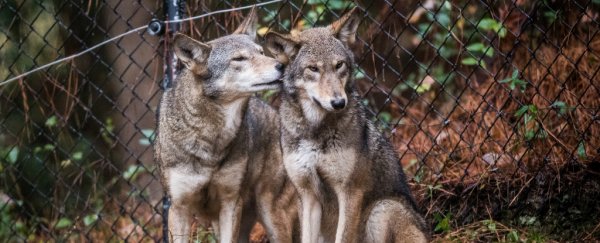In a proposal that would essentially end a 30-year effort to reestablish critically endangered American red wolves in North Carolina, the Interior Department on Wednesday announced a plan that would allow private landowners to kill wolves that stray onto their property from a protected federal wildlife refuge.
U.S. Fish and Wildlife officials who presented the proposal in a news conference said the Alligator River National Wildlife Refuge, which supports about a dozen of the 35 red wolves that roam a five-county area in eastern North Carolina, would be the only place where they would be safe.
The service's new objective, said Leopoldo Miranda, assistant director for ecological services in the agency's Southeast region, would be to intensively manage a small population of 10 to 15 red wolves at the refuge to preserve their genetic value and wild behaviors in the hopes that officials can find a location more friendly and suitable than eastern North Carolina.
Miranda declined to name areas that are in consideration to relocate the wolves. But he said, the process of identifying an area and securing an agreement to introduce wolves would likely take three years.
"Success for me right now is to keep this smaller wild population as intact as possible," Miranda said.
It will take hard work, outreach with state officials and conservation groups dedicated to saving red wolves, and research that can guide government officials to more supportive habitat.
North Carolina game officials have openly opposed the presence of red wolves in their state, and conservationists have said Interior's management of red wolves in recent years betrayed the mission to preserve them. The new proposal fueled the anger.
A public meeting is set for July 10 in Manteo, N.C. and public comment period starting Wednesday will conclude at the end of next month.
If the proposal goes into effect some time in November, as officials propose, up to two dozen red wolves outside the refuge would be left to survive on their own or potentially be legally shot by property owners who have long been hostile to their presence.
Like all wolves, red wolves are predators of mostly small game, and they naturally stray from boundaries drawn by humans. Before a federal court stopped the Fish and Wildlife Service from issuing permits to shoot wolves two years ago, the agency received at least 400 requests from landowners to kill them.
"Not only is this proposal indefensible, based on the science and the basic ecology of wolves but, it amounts to a cruel disregard for red wolves that is an absolute shame and should not be tolerated," said Ben Prater, director of the southeast program for Defenders of Wildlife.
"We're very frustrated that the agency has continued to ignore the will of the American people on the red wolf issue. In 2016 conservation groups worked together to deliver a petition with half a million names calling on the U.S. Fish and Wildlife Service to do more to save the red wolf," said Ron Sutherland, a conservation scientist for the Wildlands Network.
The decision to maintain such a small population of wild red wolves means that the vast majority of the 200 captive wolves held in zoos across the nation will never live outside a cage.
"This is heartbreaking for us," Sutherland said.
Red wolves roamed the entire Southeast United States before government sanctioned hunting programs all but eliminated them. The animals were so desperate to survive that they started breeding with smaller coyotes they once chased away or killed.
Fish and Wildlife Service recovered a few red wolves that remained in Texas and Louisiana in the 1970s and made an arrangement with zoos to breed them in captivity. In 1987, an experimental population of captive wolves was released into the North Carolina refuge in a bid to recover the animals.
The two breeding pairs expanded to nearly 140 in the early 2000s before hunting accidents and automobile collisions led to steep decline. Once again, red wolves also started breeding with coyotes that are thriving in the absence of competition from species such as gray wolves, red wolves and mountain lions.
North Carolina is fighting coyotes through hunting permits. Red wolves are sometimes shot by hunters who said they confused them with coyotes. Landowners opposed to red wolves also complained that the wolves killed livestock and reduced game animals such as deer that people like to hunt.
But data released Tuesday disputed that, as Sutherland pointed out: "Ironically, despite all of the hatred spewed at the wolves, [Fish and Wildlife] indicates that only seven confirmed cases of livestock depredation, all small animals like chickens and goats, have occurred since 1987."
2018 © The Washington Post
This article was originally published by The Washington Post.
